Public sexual harassment: The women groped and laughed at in the street
Women have been speaking about shocking incidents of sexual harassment - after a BBC poll found many often still feel unsafe walking alone at night.
The new poll suggests 43% of women in the UK have experienced unwelcome touching or groping in public.
The survey - conducted by YouGov - also indicates 28% of women have experienced indecent exposure in public.
The chair of the Women and Equalities Committee said Boris Johnson must show he takes women's safety seriously.
It follows growing pressure to make public sexual harassment a crime.
Caroline Nokes, a Conservative MP who chairs the committee, told the BBC changing the law would send a "really powerful message" and could help tackle underlying causes of violent offences against women.
"It will give women the confidence to report and sends a very clear message to perpetrators that this is criminal," she said.
The survey found two thirds - 66% - of women said they did not feel safe walking alone at night, at least some of the time. That compared to just 39% of men who said they felt unsafe in the same situation.
The findings come a year after the murder of Sarah Everard, who was abducted and murdered while walking home in south London.
Ms Everard's killer, police officer Wayne Couzens, was previously linked to allegations of indecent public exposure. Hers and other high-profile cases in the past year have led to increased awareness and campaigning around women's safety and public sexual harassment.
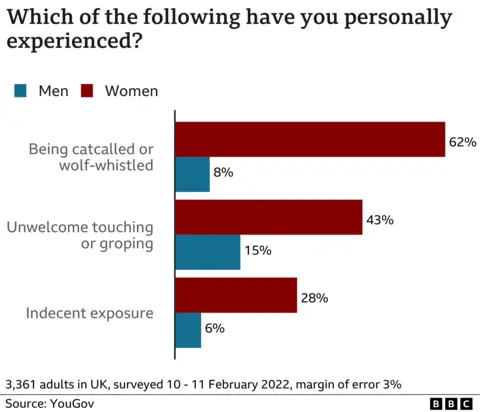
The BBC has also spoken to women across the UK about how sexual harassment impacts their lives.
One, a woman named Sarah, was on her way to a morning exercise class in Edinburgh last year when a man followed and groped her before running off laughing and filming her reaction.
"I was incredibly shocked. I remember I felt incredibly angry as well," she told the BBC. "I also felt a real invasion of privacy, the fact he had filmed the whole incident."
What happened to Sarah that day was the worst of a long history of experiences she and her friends remember going through over the years - from being groped in nightclubs as students to being shouted at by strangers in the street.
'Completely inappropriate'
"We used to be catcalled all the time as teenagers going out. It was something we laughed off and shrugged off," she said. "But as a woman now, everyone has become a lot more aware of how dangerous those things are and how hostile it is."
"There's an absolute entitlement to touch and to talk to you in a manner that is completely inappropriate," she added.
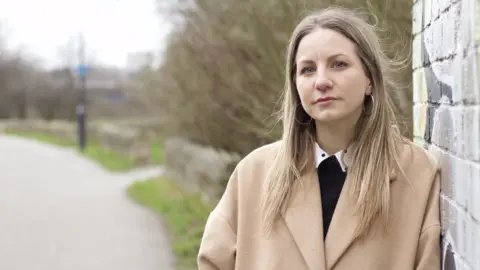
More than half of the women surveyed for the BBC said they avoided certain areas and being out at certain times to try to keep themselves safe from possible harassment and assault.
Roxanne, 26, no longer feels confident walking alone after experiencing everything from obscene comments to unwanted touching when out in public since she was a teenager.
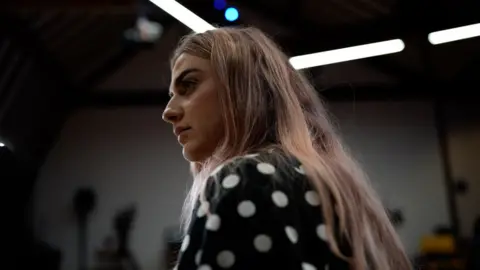
She now sticks to main roads when walking her dog and tries to only go out in daylight when she's by herself.
Like 30% of women surveyed in the poll for the BBC, Roxanne says she wears flat shoes as a way to feel safer. She also carries a rape alarm, criminal identification spray and tries not to wear her hair in hairstyles such as ponytails she fears might be easier for an attacker to grab.
"I don't know who's going to harm me, when they're going to harm me - so I'm cautious of everybody," she said. "And I think that's a natural and very common thing to feel with everything that's going on."
The latest Crime Survey for England and Wales estimated 2.2% of the population aged between 16-59 were victims of sexual assault in the year ending March 2020 - a slight decrease on the year before.
'Women should be safe'
Public sexual harassment is not currently an offence in its own right. The term refers to unwanted sexual behaviour - from verbal comments to physical actions - which can leave victims feeling intimidated and degraded.
The Law Commission - an independent body that advises the government on legal changes - recommended in December that ministers should consider creating a specific criminal offence for it during a review into hate crime laws.
Ms Nokes believes criminalising public sexual harassment could help intervene in escalating offender journeys to ensure "today's flasher does not become tomorrow's rapist".
"I think the prime minister needs to step up and show that he does take women's safety seriously and that he's not interested in a few cosmetic measures like CCTV - but actually in legislative change with a cross-government approach," she said.
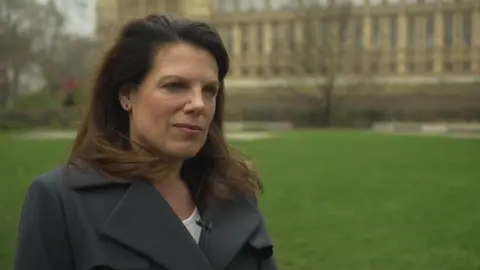
She believes current safety initiatives and advice place too much onus on women having to take precautions to try to protect themselves.
"Of course we want women to be safe and we want them to be vigilant, but this is about men attacking them when they are just going about their daily lives," she said. "Women should be safe wherever they are, whatever they're doing, however they're dressed."
Ms Nokes also supports cultural and education reforms - including with mandatory consent classes in schools, colleges and universities.
Nathaniel Horne works for a charity that runs workshops for boys and men aimed at tackling misogyny and encouraging healthier relationships.
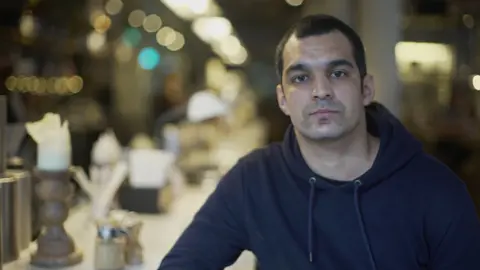
"It's important to talk to people about this stuff early," he told the BBC about going into schools. "Because I think once people are adults, and they've been out for a while, that can be entrenched in those views and those behaviours."
The view is echoed by April-Joy Serrant, who last year was exposed to by a man performing a sex act in public while out on a run. As a mother of three sons, she says her experience has changed how she speaks with her children about relationships and content they may be exposed to.
After posting a video about her experience online, she was overwhelmed by other women and girls getting in touch with their own experiences of the "day in, day out" harassment.
"It had never crossed my mind until the incident that I experienced last year that my husband can go for a walk or for a run and it never crosses his mind," she said. "And that is freedom."
The Home Office told the BBC that tacking violence against women and girls "remains one of the top priorities of this government".
"We are committed to ensuring that existing laws on public sexual harassment are effective but we continue to look carefully at where there may be gaps and how a specific offence could address those," safeguarding minister Rachel Maclean said in a statement."
She said the government last week launched a new national communications campaign and said violence against women had now been made a priority for police forces, alongside national threats like terrorism.

Have you been affected by the issues raised in this story? Share your experiences by emailing [email protected].
Please include a contact number if you are willing to speak to a BBC journalist. You can also get in touch in the following ways:
- WhatsApp: +44 7756 165803
- Tweet: @BBC_HaveYourSay
- Upload pictures or video
- Please read our terms & conditions and privacy policy
If you are reading this page and can't see the form you will need to visit the mobile version of the BBC website to submit your question or comment or you can email us at [email protected]. Please include your name, age and location with any submission.
